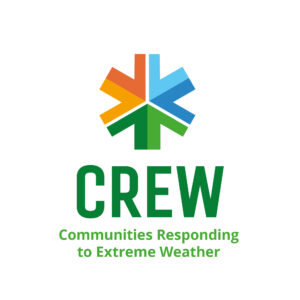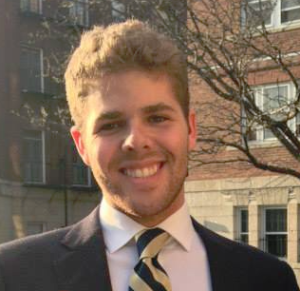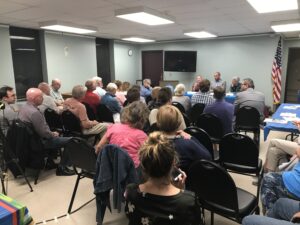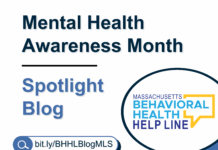 In September of 2019, Massachusetts librarians offered over 90 programs as part of the annual Climate Preparedness Week, a week full of workshops, talks, discussions, and much more all dedicated to climate preparedness and resilience. Climate Prep Week is just one of the projects coordinated by the grassroots nonprofit Communities Responding to Extreme Weather (CREW) and in this following interview Gideon Nachman from CREW will discuss one of their other keystone projects, which is the Climate Resilience Hub network. If your library participated in Climate Preparedness Week—or even if it didn’t—please read on to find out more about how you can incorporate climate resilience programming into your library’s mission. The hope is that this will provide a simple and clear way for those libraries who want to do more about climate change to get involved!
In September of 2019, Massachusetts librarians offered over 90 programs as part of the annual Climate Preparedness Week, a week full of workshops, talks, discussions, and much more all dedicated to climate preparedness and resilience. Climate Prep Week is just one of the projects coordinated by the grassroots nonprofit Communities Responding to Extreme Weather (CREW) and in this following interview Gideon Nachman from CREW will discuss one of their other keystone projects, which is the Climate Resilience Hub network. If your library participated in Climate Preparedness Week—or even if it didn’t—please read on to find out more about how you can incorporate climate resilience programming into your library’s mission. The hope is that this will provide a simple and clear way for those libraries who want to do more about climate change to get involved!
Please tell us about CREW’s Climate Resilience Hub project and what it means to be a hub.
Gideon Nachman: The Climate Resilience Hub project is one of the key ways CREW is manifesting its goal of building an equitable, communal, and pragmatic response to climate change. The idea is to have hubs all across the state that serve as centers for people to become more educated about what climate impacts are coming to their local community and how they can respond. In most cases these hubs are existing community institutions like libraries, houses of worship, neighborhood centers, and the like. We want to work with that existing community trust not against it. We’ve set ourselves the ambitious goal of having everyone in Massachusetts being no more than 20 minutes away from a hub by 2025 and we’re excited to work towards making that a reality.
So what does a hub look like in action? There are three main responsibilities for hubs. The first is to host at least one event a year dedicated to climate preparedness that is open to all members of the community. The second is to have climate preparedness information—brochures, flyers, pamphlets—available for your patrons to read and take home. These materials will be provided by CREW. The final one is to display the “Climate Resilience Hub” decal in your front window so your patrons, passerby, and anyone else who is curious knows that this is a space where that information is available to them.
Might other hubs stretch beyond those three responsibilities to address community-specific needs? Absolutely and we very much hope so. But we intend that to be on a case-by-case basis. The goal here is to have fewer barriers of entry to climate resilience, not more.
How can a library become a Climate Resilience Hub?

Gideon Nachman: By getting in contact with a member of CREW! (I’m always available over e-mail at gideon@climatecrew.org) We’ll have a conversation about what being a hub would look like for you and your community and then I’ll send over our memorandum of understanding. Once you sign and send back that MOU, you’re all set and we can start sending over our materials and figuring out the best way forward to incorporate climate resilience into your programming. The whole process can be done in a day, if that’s easiest. Lastly, I want to emphasize that there is absolutely zero financial commitment or expectation necessary to become a hub. All of CREW’s materials and trainings are provided free-of-charge to the hubs.
What resources are provided by CREW to support Climate Resilience Hubs?
Gideon: The first and most important resource we provide is our literature and materials. These are designed to be sharp, concise, accurate, and informational. We’ve gotten a lot of good feedback on the way they look and feel so far. (We also have materials available in Spanish and Portuguese if that is something your library needs.)
 Secondly, we provide training and presentations. We have a large network of climate activists we can tap into and whether your community is looking for someone to come and speak about the actual steps one should take during a flood or the broader patterns of how communities can build lasting change, we can provide that. And if we can’t, we can help find someone who will.
Secondly, we provide training and presentations. We have a large network of climate activists we can tap into and whether your community is looking for someone to come and speak about the actual steps one should take during a flood or the broader patterns of how communities can build lasting change, we can provide that. And if we can’t, we can help find someone who will.
The third is being a part of the broader Massachusetts climate movement. CREW itself is housed within the Better Future Project and is a sister organization of 350Mass and DivestEd. And while we are distinct from those organizations, with our own staff and our ethos, we like to work across our different coalitions to build flexible and diverse solutions to local needs. We really pride ourselves on the partnerships we have and we want to funnel all this great and disparate knowledge into local, on-the-ground institutions.
Lastly, we have a commitment to providing regenerative support that respects those who work at the institutions we partner with. Librarian burnout is real. Caretaker fatigue is real. We’re making sure as we go forward that we incorporate emotional and psychological resilience into our programming as we need to take care of ourselves as we start taking care of the planet.
Any other thoughts you would like to share?
Gideon: If you had the goal of making 2020 the year you really start to do something in terms of working towards climate resilience, this is a great place to start. If you’ve always had the nagging sense that you’ve wanted to do something, but didn’t know where to go or what to do, this can be a great place to start. If you know you’ve wanted to do something, but haven’t yet had the time, this could be the time. We’re here to support libraries as they do this work. It’s not easy, and it can be an uphill climb, but it’s not one you’re expected to make alone. Let’s work together.
I also want to thank Michelle Eberle, Madeleine Charney, Ellen Snoeyenbos, Gabrielle Griffis, Corey Farrenkopf and all the other fantastic librarians we’ve worked with so far. It has been nothing but a pleasure to see firsthand the wonderful work you do for your communities.
And I would be remiss if I didn’t share that resilience hubs are just one of the many programs CREW has! You can learn more at climatecrew.org or follow us on most social media platforms @climatecrews. And again, I’m always here at gideon@climatecrew.org.
Interview with Gideon Nachman, Communities Responding to Extreme Weather (CREW)
Interviewed by Michelle Eberle, MLS Consultant
Featured photo highlights the Lynn Public Library’s Climate Preparedness Week event from September 25, 2019: A partnership with the New England Aquarium to bring environmental education and awareness to kids.


